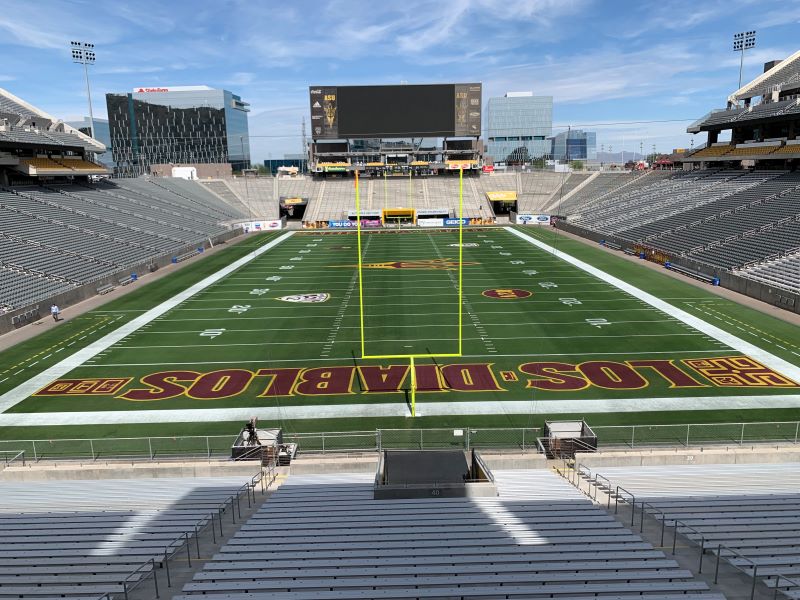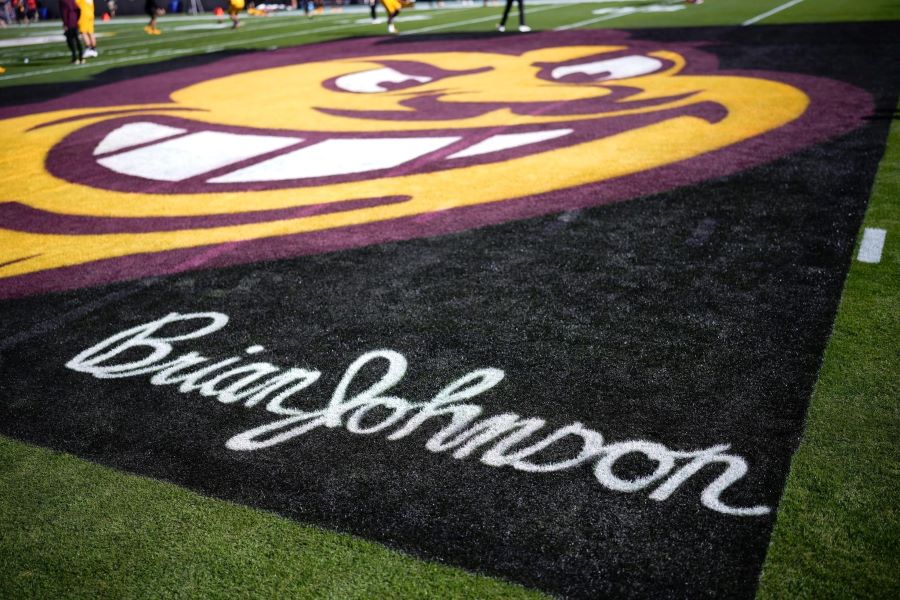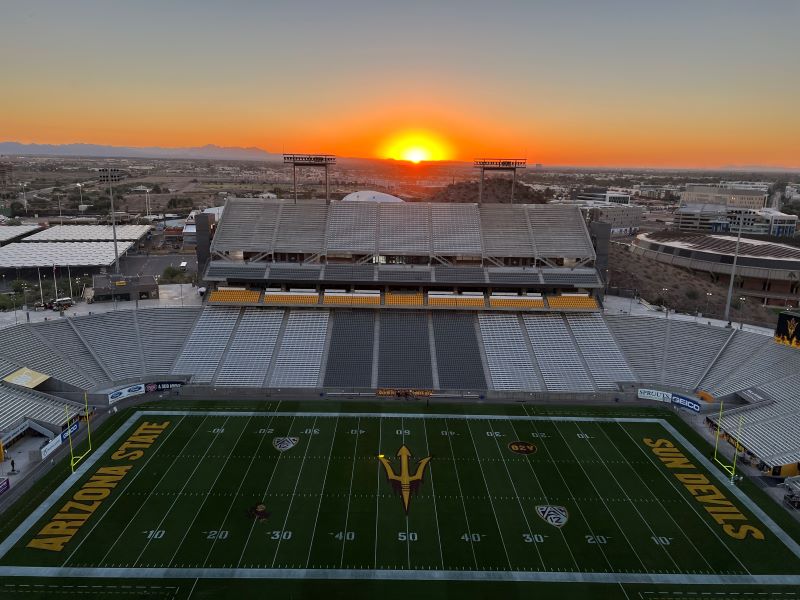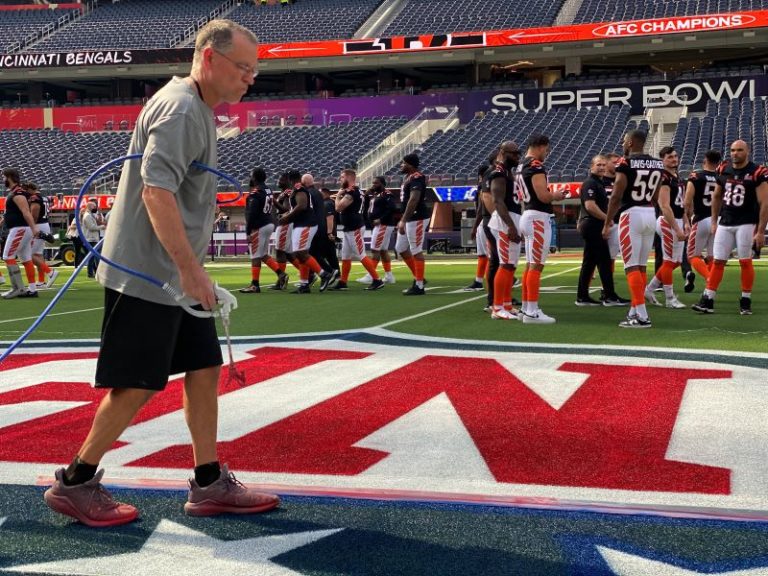For this installment of the SportsField Management Interview, we spoke with Brian Johnson, manager-athletic grounds, Arizona State University (ASU), who is retiring May 13 following 37 years at ASU. In addition to his career at ASU, Johnson has helped prepare the field for the Super Bowl for more than 25 years, as well as working on fields for the NFL Pro Bowl and international NFL games.
SportsField Management (SFM): You have been at Arizona State University for 37 years, beginning with an internship. What attracted you to the sports field management industry?
Johnson: Just being an outdoors person. I attribute that to the times we grew up in. Kids these days spend much more time inside – whether that is on their phones or playing video games. Back in the day, we were just outside all the time. I developed an appreciation for being outdoors. Playing baseball in high school, we didn’t have a full-time groundskeeper, so the players had to work on the field. Most of my teammates didn’t have any interest in that, or would rush back to the locker room after practice. I was the guy who stayed late and made sure the field looked good for our upcoming game or even the next practice. So, I just found myself being drawn to that, and wanting to show up to the field with it looking nice.
SFM: From the time of your internship at ASU until now, what has been your career path at ASU or what are the major milestones that you point to when looking back on your career?
Johnson: When I started out at ASU after my internship, I was our baseball guy. I worked at Packard Stadium, which was our baseball facility, and I was in that role for 12 years. I knew very little compared to college kids these days who are starting out well equipped and have so much knowledge from their turf degrees. I didn’t have a turf degree, so a lot of my job experience those first 12 years was trial and error. But I enjoyed the work. While I was our baseball guy, I would go up to the football stadium on Fridays – paint days – and paint the field for football games, which I really enjoyed.
When Don Follett left in 1997, I got the job at Sun Devil Stadium. That was a big switch. It was kind of difficult at first. My first year at Sun Devil Stadium I felt like an out-of-place baseball groundskeeper doing football work. Football is different work than baseball, and I was a bit nervous. But then I grew into that role and began to embrace it. In the long run, it all worked out for me. I developed a love for the football aspect of groundskeeping.
Super Bowl XXX at Sun Devil Stadium is how I got my start working those games. So, it was a case of the right place at the right time for me. If I’m looking at milestones in my career, that Super Bowl involvement was a big one.
Shortly after Sun Devil Stadium, where I was solely doing ASU games and Cardinals games, we changed our system to where I was put in charge of all of our athletic fields. One aspect that I really like about college athletics is having so many different experiences with different sports and different fields and the best way to maintain them for each sport.

SFM: Can you give us a feel for your staff at ASU and your overall role?
Johnson: We have a lot of acreage here that we maintain – football stadium, baseball stadium, football practice fields, track, softball, soccer, lacrosse, the whole works. I am really blessed to have a talented staff. There are six of us full time that take care of all of that; and we also have a student staff. I’m really proud of all the work that we’ve been able to do – especially with our student staff. We’ve had to rely heavily on students over the years for a lot of the groundskeeping. And these students are not necessarily in it to become a groundskeeper – they are just looking for some part-time hours. I think the quality of work that we’ve been able to achieve with the at times limited or inexperienced staff is something I’m proud of. We’ve really upped our game with our full-time staff. I feel like we must have one of the most talented groundskeeping staffs in the country. They are just so wonderful.
SFM: What is your approach to not only managing others but to teaching or mentoring the next generation of industry professionals, or even students who might not be going into the industry; and what do you hope they take away from working with you?
Johnson: With students, you really have to develop a relationship with them. That goes for the full-time staff as well. It’s important to develop that relationship and show an interest in what they have going on in their life. As a student, they have pressures – whether those are financial or academic. If you develop that relationship, they will, in turn, work hard for you. I feel like they would do anything for me, and I would do anything for them.
I don’t necessarily get caught up in the work itself. If somebody makes a mistake on a field, I think it’s better to look at the broad picture of them wanting to enjoy their job here. They will pick up things and learn the best way to do things – either through trial and error, like I had to do, or from me teaching them. I just try to keep the big picture in mind and develop a good camaraderie with our staff. I think it’s so critical to have fun at work – not that we are not serious about the work we are doing, but having a staff that is on the same page and get along is so helpful.

SFM: What are the keys to getting young people interested in the sports field management profession?
Johnson: There are interesting parts of our job that aren’t available in other careers – developing relationships with coaches and athletes and getting feedback from them; and you have a chance to work on a field that is seen on TV by millions of people, which is something to be proud of. What was so helpful for me is that I love all the work that my job entails – every part of it. I love spending all day on a hot day in August painting the football field, bent over, paint all over me. I love jumping on the mower and mowing. I love vertislicing the field in the middle of summer when it’s really hot. I may be a little crazy loving all of those things. I don’t know that I would approach somebody starting out by saying, “Hey, you get a chance to bend over and paint all day long and sweat so much you are going to lose 10 pounds, or go home all dirty and dusty from vertislicing.” I don’t think that’s a big drawing card. But for me it was, because I love all that stuff. It’s the tangible evidence that you have. When we finish painting the field, I can go up in the stands and I can look down there or watch a replay of the game later and say, “That looked really good, and we were responsible for that.” People in other careers might be doing a good job, but there is not the tangible evidence like a beautifully painted football field or a manicured baseball field that you can point to and say, “I did that.”
SFM: You mentioned your involvement with the field preparation for many Super Bowls over the years, as well as other major NFL games. What has been the best part of that involvement, or what stands out to you most from those experiences?
Johnson: It’s a great opportunity to be able to work on the field for a game of that magnitude. It’s not the 12- to 14-hour days, seven days a week, that I’m going to remember the most about it. But because you are working such long hours with such a great group of people, you have the opportunity to develop relationships and friendships with so many different groundskeepers. Everybody might have a little different way of doing things, so you are able to learn a few things from others. And I think I’m able to teach others some things that I’ve been successful with. So, that giving and sharing among all of us, and that camaraderie that develops over a three- to four-week period is really special. I have so many friendships – lasting friendships – with some great people, I will remember that more than any particular Super Bowl.
I’ve been doing the Super Bowls for so long that I have gone through stages there. I found myself this year at the Super Bowl having a lot of young guys helping me paint the NFL shield at midfield. Many of them were working their first Super Bowl. It snuck up on me that people were looking to me for guidance or to lead them. I just remember the way we were going about that and the extra measuring I was having them do. Somebody would lay a board down to trim a certain area and I would say, “Hey, hold on. That piece has to line up with another piece on top, so let’s run a string there and measure off, because that could be a quarter inch off up there. We need to have it parallel.” I didn’t know if they thought I was crazy or if they were learning. But then, on game day, a lot of them wanted to take a picture with me, and I felt like, “Oh, now I’m the old guy young people are looking up to.” I had always looked at myself as just one of the guys, but it really is a cool opportunity to share some knowledge with young groundskeepers. It is very rewarding.
SFM: Along the lines of friendships and relationships in the industry, do you have anyone who was a mentor to you or who you looked to for advice?
Johnson: When I started at ASU, I was kind of out on an island at the beginning and I relied on a lot of trial and error. Don Follett was here at Sun Devil Stadium, and I did learn a lot from him before he left. But I’m going to give you an answer that is a bit outside the box, and that is the guy I bought fertilizer from when I first started here at ASU – a man named Dennis Kemp. Since I didn’t have a turf degree, I really knew very little about the science part of groundskeeping. He taught me so much about why products were working, and why some wouldn’t. When I had a soil test done, instead of just giving me the report back and saying, “do this, this and this,” we would sit down for four hours and go over every part of that. I feel like I got a mini college education from him, and that was so critical to me. When I look back on it, he was one of the biggest influences I’ve had in my career here at ASU. I just appreciate everything that he did for me.
SFM: You are known for your field painting skills. What is your approach to, or process for, the artistic side of the profession? And how does the artistic side balance with the scientific side of the job?
Johnson: The two go hand in hand. When you are managing a football field, the grass is the most important thing. A beautifully painted field on grass that may look aesthetically pleasing on top but isn’t stable is just not going to work. It’s an interesting balance when you have grass that you want to be healthy and then you just blast it with paint. So, I try to balance the two. I do like a traditional football field, kind of simple. We do paint a 6-foot border around it, but just letters outlined in the end zone rather than a full endzone with the background. When we do a background endzone, it’s usually just twice per year for special games, because of grass health. I don’t want to just pound that endzone grass full of paint every week.
Fortunately, with the artistic side and painting, I have a really great assistant, Josh Lenz, who is so creative. When we do something creative on the field, we will kick around an idea, and I will do a mock-up of what I’m thinking, and he will do one. I will be proud of mine, thinking this will be great. Then we will compare notes, and I will be like, “Oh, it looks like we are going to be doing yours.”
It really is fun to do those things, and do something special out there. We are blessed here at ASU that we get a lot of support from our administration when we come up with these ideas. One thing I like about college groundskeeping is that we can get away with a few more things. The NFL is a bit more rigid, and they like things looking uniform. We have the ability to push the envelope in terms of creativity.
And it’s also good to be known for something like that. There are a lot of worse things you could be known for. It’s really enjoyable, and I get excited to this day when we have a particular design planned and carry that out and put it on the field. It’s a really rewarding part of the job. To take this little idea you were kicking around a few weeks prior and turn it into this beautiful logo on the field is really cool.

SFM: What are, or what have been, the biggest challenges you have faced in your career, and how have you approached those challenges?
Johnson: Especially back in my baseball days, we had a pretty limited budget and had to get creative. I would have to think of some easier ways to do things because I didn’t have the manpower or didn’t have the materials. But we have everything we need to do a good job.
The hours, the time away from family – there are some stresses with this job. It’s not all butterflies and rainbows. You have weather that can impact things. Losing sleep at night. You just need to know yourself and know your limits with handling the stress of the job.
With that being said, when I think back on my career as a whole, it has just been a huge blessing. I’ve been able to manage those stresses pretty well to where I look back on all the good times.
SFM: How do you think the sports field management industry will change in the next 10 years, and/or what would you most like to see in terms of industry advancement in the future?
Johnson: Right now, I feel like we have made so much progress, that maybe we’ve reached the peak. But I’m sure in 10 years some of the things we are doing that seem state of the art are hopefully going to be looked at as archaic. What that may be, I’m not sure.
But whether a groundskeeper comes up with an idea to make their field a lot better, or an advancement in technology, or just a different way of doing things, with the SFMA or the magazine, that information is not going to just stay with that groundskeeper. And the SFMA has been the vehicle for people to learn and for information to get out there. It’s one of the biggest reasons for improvement that we’ve had, and the reason secrets aren’t kept. The reason fields are looking better is a direct result of the SFMA bringing everybody together and educating people, and just giving credibility to our profession.
People are more than happy to share and improve the industry as a whole. That has been so critical. Now, when people make advancements, it’s easily spread and passed on. People are more concerned with advancement of the profession as a whole rather than their own situation or their own stadium. I don’t know what it will be, but I know there will be some things coming that will get shared, and hopefully sports fields keep improving.
SFM: Can you tell us a little bit about yourself outside of work (family, hobbies, interests, etc.) and your plans for your retirement?
Johnson: I’ve been married for 34 years. My wife, Allison, has been so supportive. When we were first married, I told her “I’m not making very much money; I’m going to work a lot of weekends and a lot of holidays; I might miss out on some family birthday parties; but I love my work, so take it or leave it.” She was totally on board with that, and we have had a great marriage and a great relationship. Coaches’ wives always get the credit for holding things down while their husbands are working late, but you never hear about groundskeepers’ wives. But they should be included in that.
I have two boys, ages 32 and 31, Austin and Travis. Austin lives in Minneapolis, and Travis lives in Fort Wayne, Ind., so we like to travel and visit them. I’ve been blessed with a great family life.
In terms of retirement, I just want to do a lot of fun things. We love to travel, so I’m going to travel a lot. Besides overseas trips, there are so many places here out West that we haven’t had the time to visit. We want to do some spur-of-the-moment trips. My hobbies are hiking, camping and traveling.
I will still be involved with the NFL and the Super Bowl and the overseas games. That will keep me involved with painting and keep me in touch with groundskeepers. But I don’t want to be one of those people who works more in retirement than they did during their career. I want to make sure I have a lot of time to do some fun things that I missed out on with the hours spent in my career.

SFM: A lot of people – in all industries, but especially in this industry – bounce around from job to job. You have spent your entire career, 37 years, with one organization. What is special about Arizona State University to you?
Johnson: It’s a testament to ASU, and a testament to mowing grass in February when it’s 85 degrees and I’ve got shorts and flip-flops on. I love the area. All my family was back in Minnesota. Fortunately, I met my wife, and I had a new family here. This is my home.
I never felt the need to look elsewhere. I had everything I needed right here. I had great people working around me, great bosses, and a great administration. I relatively recently developed a great relationship with ASU fans through Twitter. It was very comfortable for me here. I didn’t feel the need to move on. If any of those things weren’t there, I might have been more apt to look elsewhere. But I have been very blessed to work for a great university. I guess it is rare for someone to spend so many years in one place, but I’m proud of that.


